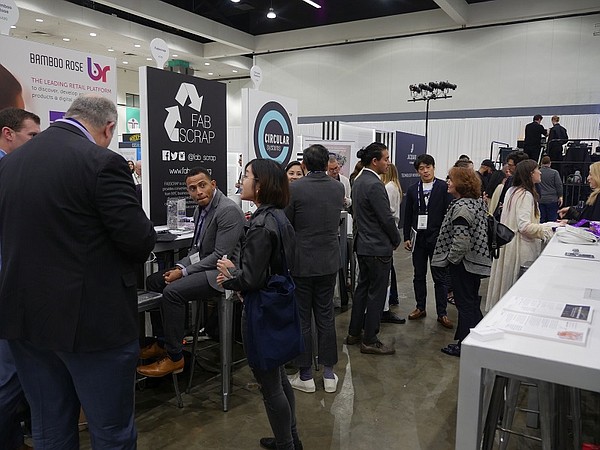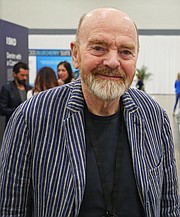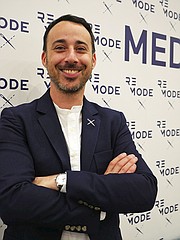REMODE RETHINKS FASHION
UBM Unveils Sustainability Show ReMode
Sustainability has increasingly been a topic in fashion circles, but UBM, parent company of the MAGIC trade show, gambled that everything from eco clothing to responsible manufacturing could be the center of a trade event.
The inaugural ReMode show ran Nov. 13–14 at the Los Angeles Convention Center in downtown Los Angeles.
Pierre-Nicolas Hurstel, ReMode’s founder, said the event tried to combine everything from trade shows and industry conferences to networking events and informative panels. However, ReMode also tried to carve out its own category. “It mixes content, discovery and networking with the goal of bringing this community on a journey of change and progress,” said the French-born, New York–based Hurstel. He also serves as the executive vice president of strategy and business development for UBM.
“It’s here to create an open collaborative forum where brands, startups, leading solution providers and influencers collaborate to find solutions to the problems of the fashion industry,” he said.
About 100 exhibitors were at the inaugural ReMode. They included retail/fashion-tech companies Shopify and Joor, which took booth space in the same hall as Circular Systems, which makes fabrics out of agricultural waste such as sugarcane husks and recycled fibers.
ReMode may represent the first time a leading trade-show company has produced a big event focused on sustainability in America, said Isaac Nichelson, co-founder of Circular Systems.
“The U.S. is lagging behind Europe,” Nichelson said of events devoted to sustainability. “We need to show the local market what we’ve been up to.”
Much of ReMode’s star power was seen in a series of speaking panels held at the show. Movie star Rosario Dawson spoke about her sustainable fashion brand Studio One Eighty Nine. Denim pioneers Adriano Goldschmied and François Girbaud also spoke about sustainability and denim.
“I’ve been fighting for sustainability since day one,” Goldschmied said after his talk. “I’ve been a voice in the desert. Today is different,” he said about the increasing cultural cachet of sustainable fashion. “Sustainability is not a marketing tool. It is something that has to change the industry. A conversation is not enough.”
Other topics at panels included Jennifer Silberman, Target Corporation’s vice president of corporate responsibility, discussing Target’s sustainability initiatives. Kristin Savilia, Joor’s chief executive officer, discussed new strategies in wholesale.
Kathleen Talbot, vice president of operations and sustainability for the Reformation label, spoke about the issues of building a sustainable brand. Also serving on the panel were Amy Hall, vice president of social consciousness for the Eileen Fisher label, and Sheila Shekar Pollak, chief marketing officer of Athleta. Other panel topics included 3-D printing and how to fund brands.
Exhibitions and installations were a notable part of the show. X-Ray Fashion, a virtual-reality film, was shown. Produced by Vulcan Productions and the late Microsoft co-founder Paul G. Allen, X-Ray Fashion aimed to immerse viewers in the experience of fast-fashion manufacturing. One of the 15-minute VR film’s segments took place in a Bangladeshi sweatshop.
Galerie.LA, a downtown Los Angeles sustainable-clothing boutique, produced a 400-square-foot pop-up shop at the event. Boutique founder Dechel Mckillian exhibited sustainable brands including Enda, Where Mountains Meet and Triarchy.
Also at ReMode was Turkish textile manufacturer and distributor ISKO, which exhibited a one-of-a-kind fashion collaboration with French denim pioneer Girbaud.
Some exhibitors said that traffic was light at ReMode’s inaugural show. However, the quality of attendees surpassed the number of people, Circular Systems’ Nichelson said. Attendees often were brand executives and sustainability officers for fashion labels.
Shahrooz Kohan, chief executive officer of enterprise-resource-planning software AIMS360, said that event producers needed to bring in a bigger crowd. “They have great speaking sessions and opportunities for learning, “Kohan said. “But they needed to bring in more people. In fashion, there are always more new people coming up.”
Among those speaking was Ayesha Barenblat, founder and president of Remake, a digital-media company for news and tips on sustainable fashion. She said there needed to be more of a flow of ideas between speakers and audience at the ReMode panels. There were no opportunities for questions and answers after the panels, but she thought the event was a great beginning. “I’ve been at this for years. I’ve never seen this groundswell of sustainable brands,” she said.
























